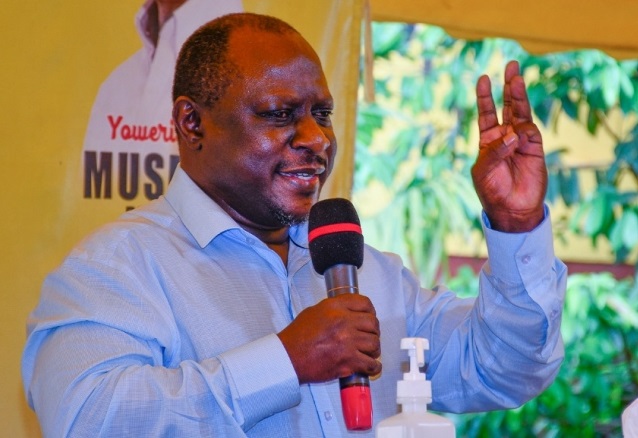By David K Mafabi
Two weeks ago, Ambassador Francis Katana invited me to address a one-day public dialogue hosted by the Uganda Council on Foreign Relations on the topic, “Is the East African Community and Security Architecture in Crisis Amidst the Current Conflict Escalation in Eastern DRC?” Ambassador Katana specifically requested me to discuss, alongside Ambassador James Mugume, the main presentation delivered by Prof. Phillip Kasaija Apuuli.
As a Pan-Africanist activist and researcher, I immediately accepted the invitation to participate in the public dialogue, which took place in Kampala on Thursday, 20th February 2025. I was accompanied by Special Presidential Assistant/Special Duties Barbara Nabiryer and compatriot Prossy Namanda, one of our Special Mwangaza Mobilizers.
Our simple but unadulterated message to the dialogue was that the struggle for the accelerated political and economic integration of East Africa must continue unabated and that we are making significant progress in constructing a formidable 300 million-people home market for agriculture, industry, services, and ICT, stretching from the Atlantic to the Indian Oceans.
Before sharing the rest of our remarks, it is important to take note of the central issues presented by Prof. Kasaija and Ambassador Mugume.
Prof. Kasaija highlighted the challenges within the East African peace and security architecture. He pointed out that structures such as the EAC Panel of Eminent Persons and the EACWARN are moribund, and that intractable conflicts, defined as intense, deadlocked, and resistant to de-escalation, persist. Examples include the conflicts in Eastern DRC, South Sudan, and Somalia. He noted that the prolonged nature of these conflicts has rendered the EAC’s peace and security architecture ineffective.
Furthermore, EAC political leaders have often sought to avoid the organization’s involvement in their political affairs. He also raised concerns about competing regional peace and security frameworks and the issue of “forum shopping,” where the DRC, being a member of multiple regional economic communities such as the EAC and SADC, chooses different platforms to address its security challenges.
In conclusion, he emphasized that while the EAC peace and security architecture is meant to prevent, manage, and resolve conflicts, many of its structures remain non-functional, leaving intractable conflicts like the situation in Eastern DRC to persist.
Ambassador James Mugume underlined the need to re-examine the peace and security architecture of the entire African Union. He called for a decisive resolution of the “Grand Debate” on African integration and stressed the urgency of settling issues related to M23 and other armed groups in Eastern DRC.
Our thoughts and questions to the forum were centred on the fundamental purpose of the peace and security architecture. Whether at the level of the EAC or the AU, it should serve the integration objective of these organizations rather than being discussed in abstraction. In celebrating the East African Common Market, ahead of the East African Monetary Union, we pointed to the principles of variable geometry and asymmetry in the Treaty Establishing the EAC, which allows flexibility among member states in its implementation.
Regarding the various communities in Eastern DRC and the states to which they belong or are supposed to belong, we expressed no fears over the long term. However, we strongly condemned the wanton loss of life resulting from the complex and protracted nature of the conflict. We suggested that this issue aligns with what Gen. John Garang described as “The Contemporary National Question” in states created by colonialists as they balkanized Africa. President Yoweri Museveni has also referred to this as “the original sin.”
This discussion naturally moves us away from the traditional Westphalian concept of the nation-state, which emerged during the rise of capitalism and industrialization in the West. Soviet Marshal Josef Stalin was eloquent in his discussion of the nation, emphasizing that a common economic life is at the heart of national convergence and integration. We questioned how this concept should be applied to neo-colonies with stunted, incomplete, and distorted processes of national and state formation. We argued that this is first and foremost an ideological and philosophical question that committed Pan-Africanists must grapple with today.
In the same context, we referred to the symposium held in Kampala on 8th April 2002, which we co-hosted with the Nyerere Foundation on the theme, “Reinforcing the Region’s Solidarity by Setting a Regional Agenda for a Culture of Peace, Unity, and People-Centered Development.” This symposium, addressed by eminent leaders such as the late Mwalimu Julius Nyerere and President Museveni, categorically dismissed the reckless and irresponsible narrative of a Hima-Tutsi conspiracy in the Great Lakes region.
To conclude, years ago, Prof. Sam Tulya-Muhika accurately posed and correctly answered the question of why we integrate: it is to develop, to overcome, transcend, and supersede the 600-year-old economic and structural handicaps imposed by global systems of division of labor and markets. Prof. Francis Matambalya borrowed the Japanese concept of the “Flying Geese Phenomenon” to illustrate the necessity of creating a centre of gravity for Africa’s transformation in a global community of nations.
However, the place of honour in this discussion must belong to President Museveni’s July 1998 paper, “Towards a Closer Cooperation in Africa.” At the risk of oversimplification, following the thoughts of Mzee, we need to accelerate political integration—whether through federation or confederation—to make integration work.
The writer is Senior Presidential Advisor, Political Affairs (Special Duties), State House
Send us your story or opinion on: dailyexpressug@gmail.com. You can also follow Daily Express on WhatsApp for all the latest news and updates.


